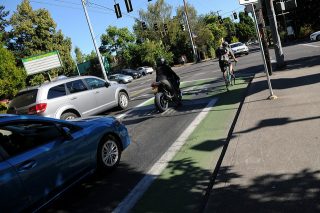
The Street Trust will host a rally this snowy evening at 5:30 pm Powell Park to show support for the bike lanes on SE 26th Avenue.
The saga on this street (which we’ve been reporting on since 2015) has opened up an important debate over whether narrow bike lanes are better than no bike lanes at all — and whether having a safer bikeway two blocks away is a reasonable justification for getting rid of one. It also shows just how far the City of Portland is willing to go to stay in good graces with its powerful state partner, the Oregon Department of Transportation.

(Photo: J. Maus/BikePortland)
As we reported earlier this month, the removal of these bike lanes is imminent because the Oregon Department of Transportation has deemed them unsafe. The Portland Bureau of Transportation also signed an agreement with ODOT that they’d removed the bike lanes in exchange for the permit needed to put a new crossing and signal on state-controlled SE Powell at 28th. Beyond that permit agreement however, ODOT has been unable to cite any research or statistical analysis to justify their decision. ODOT reasons that simply by encouraging people to avoid using 26th, they are making cycling safer.
The Street Trust however, calls the 26th Avenue bike lanes, “a critical piece of bike safety infrastructure located directly outside Cleveland High School.” As such, the organization says, “We must do everything we can” to prevent their removal. A former leader of The Street Trust said they’d even consider a lawsuit if necessary. A petition started by The Street Trust earlier this month has been signed by 1,000 people.
So far it appears ODOT is unswayed. Asked again last week for a specific justification for requiring PBOT to remove the lanes (the street is owned and managed by the City of Portland), ODOT told us via email that the existing lanes, “Provide a false sense of security and are worse than having no marked bike lanes at all.”
Here’s more from ODOT’s response:
“Bicyclists currently are drawn into a dangerous intersection at 26th and Powell – one with a history of bike crashes. ODOT worked with PBOT on their 20’s Bikeway project, and we together agreed to the new bike/ped signal at SE 28th that provides a better, safer crossing. Consistent with transportation agencies around the country, ODOT is closing unsafe pedestrian crossings and making changes in vehicle traffic flow to avoid situations that compromise safety.”
The bike lanes are definitely substandard and have a width of just three feet for 130-feet immediately north and south of Powell Blvd. Beyond that they widen to just 4.5 feet. 26th itself doesn’t have a bad crash safety record, it’s the intersection at Powell that’s problematic (and PBOT has already added green bike boxes there). Even still, ODOT claims the street would be better off without the bike lanes.
The question remains: Will getting rid of the safest vehicle users and giving more space to the most dangerous ones really improve safety?
Opinions are mixed.
Some people who ride bikes say it’s not that big of a deal and they’re happy to use the safer bikeway on 28th. “As someone who lives and commutes through the area, I’m failing to see the reason for the outrage,” wrote a commenter named Jeff. “At this point, why wouldn’t you choose to ride on 28th?” And on Twitter this morning, Rich Posert told us, “I’m not sure I agree we need or want the lanes on 26th to stay.”
Advertisement
In an opinion piece we published this morning, reader Kiel Johnson shared his opposition to ODOT’s decision. He feels it’s just the latest sign that ODOT leadership needs a major shake-up:
“How did the city that once served as the national beacon in innovative transportation policy get to a point where we are reactively removing bike lanes with no justification? This is a question that I hope the elected officials who oversee ODOT think deeply about. The lack of vision and a culture that apparently does not value facts or community input ultimately falls with the director of ODOT in Portland, Rian Windsheimer.
We all love Portland because of its livability. Today one of the biggest local institutional obstacles to that is the reductionist and reactionary culture at ODOT. A culture that is willing to trade safety of intersections around like baseball cards. For Portland to become the city it can be, where livability is shared equally among all the people who live here, ODOT needs to change. Keep the bike lane on 26th and show Mr. Windsheimer the door.”
What about PBOT? After all, it’s their bike lanes they’re being told to remove. ODOT’s statements make it seem like the city is in lockstep with them on this issue. But that’s not the case. Yes, the city’s official line is one of agreement with ODOT. That’s predictable because PBOT not only signed on the dotted line and made a promise to remove the lanes, they also know ODOT holds considerable power and pursestrings and it’s not politically smart to pick a fight over this.
But it’s also clear PBOT has mixed feelings.
Citing a traffic analysis taken after the new crossing on 28th was installed (we’ve requested that data), a PBOT spokesperson told us on February 6th that, “PBOT believes there was evidence to justify the State Engineer to reconsider his decision and leave the bike lanes in place.” (Last week we asked ODOT to respond to that statement. They said, “The data was reviewed by ODOT Region 1 decision makers including both the Region and State Traffic engineers and found to be inconclusive and did not provide sufficient justification for reversing the decision to remove the bike lanes.”)
And let’s not forget the difference of opinion shared by PBOT’s lead bike planner Roger Geller when this issue first popped up. “The research on safety seems clear,” Geller said in a letter to the City’s Bicycle Advisory Committee in 2015. “There is a safety benefit to having bicycle lanes on the roadway—even at only 3’ wide. This safety benefit is not just for people bicycling on the street but also for people driving on the street.” He then cited four studies to prove his point and concluded the letter by writing, “Would the street operate more safely without bicycle lanes than with? Based on the evidence I’d have to say no.”
ODOT spokesperson Don Hamilton dismissed these disagreements when I brought them up in a phone call last week. “That’s not what we’re hearing form PBOT,” he told me. Hamilton acknowledged that bicycle users are bearing a heavier amount of burden due to ODOT’s decision, but he maintains the agency is just trying to, “Make this safer for everybody involved.” “And part of that,” he continued, “is to move the bike lanes to a safer location.”
“We’re not banning anybody from crossing Powell from 26th, we just don’t want to encourage it.”
PBOT Commissioner Dan Saltzman tells us he’s aware of the issue. His Senior Policy Director Matt Grumm said PBOT was hoping to do more thorough counts in spring. “The commissioner is disappointed that ODOT is requiring PBOT to remove these lanes before the spring when PBOT could conduct more realistic counts,” Grumm shared via email. “We’ve also come to understand that PBOT and ODOT do these counts differently with PBOT counting bikes and ped, but ODOT only counting bikes.”
But similar to PBOT, Grumm said Commissioner Saltzman’s hands are tied. “The commissioner supports PBOT following through on their commitments as integrity is key to any relationship and the one between PBOT and ODOT is already challenging. It would be seriously impacted if one party believes the other has not followed through on their commitment.”
— Jonathan Maus: (503) 706-8804, @jonathan_maus on Twitter and jonathan@bikeportland.org
Never miss a story. Sign-up for the daily BP Headlines email.
BikePortland needs your support.
